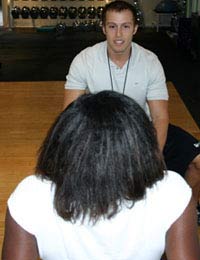- Like
- SHARE
- Digg
- Del
- Tumblr
- VKontakte
- Flattr
- Buffer
- Love This
- Save
- Odnoklassniki
- Meneame
- Blogger
- Amazon
- Yahoo Mail
- Gmail
- AOL
- Newsvine
- HackerNews
- Evernote
- MySpace
- Mail.ru
- Viadeo
- Line
- Comments
- Yummly
- SMS
- Viber
- Telegram
- JOIN
- Skype
- Facebook Messenger
- Kakao
- LiveJournal
- Yammer
- Edgar
- Fintel
- Mix
- Instapaper
- Copy Link
Learn What Personal Fitness Training is all About

A Personal Fitness Trainer is a Professional who Helps People Achieve Their Physical Fitness Goals
A personal fitness trainer is a mentor and motivator who guides people one on one through workout routines consistent with the client’s goals. Personal trainer is synonymous with personal fitness trainer, fitness trainer, physical trainer, Certified Personal Trainer, and CPT.
The Exercise Program Prescription is Based on the Assessments
A personal training program begins with an individual consultation which includes a fitness assessment. Once the client decides to start the program, the trainer gives the client a body composition, posture, strength, flexibility, and cardio endurance assessments.
As the clients are put through the exercise program, the trainer must rely on the feedback given to them by the clients to progress the intensity of workouts.
The type of workouts are dependent upon the goals and outside-the-training-session exercise of the client.
There are personal trainers which specialize in many different aspects of fitness.
Some personal trainers use a little bit of everything to create complete workouts which may include, cardio, weight training, core exercises, pilates, kickboxing, stretching, jumping, running, and every exercise you can think of.
Personal Trainers are Responsible for Keeping Their Clients Accountable
Keeping their clients accountable for their health related behaviors outside of the training sessions is a major determinant of the success of a client and should not be overlooked.
Even though nutrition advice is part of a personal trainer’s expected service towards their client, there are limitations to personal trainers who do not have any sort of nutrition certification.
Since personal trainers are not RDs (Registered Dieticians) they are not allowed to prescribe specific menus for their clients. A personal trainer should address nutrition with tips and advice rather than a specific prescription, unless certified to do so.
A Personal Trainers Job Duties Vary upon Job Location
It is not uncommon for a beginner personal trainer to train very few training sessions. Some personal trainers even start by working the frank desk of the local gym. A personal trainer’s responsibilities may include making sure all the equipment is safe, clean and in order.
Even if a personal trainer trains many clients and there are people whose jobs are to keep the facilities, personal trainers should always take pride in their facilities and keep them up to speed.
If you are an independent contractor, your duties as a personal trainer may include, paperwork, advertising, promotion, web mastering, marketing, sales calls, and transportation. You can learn more about different personal trainer job options.
Where do Personal Trainers Work?
A Personal Trainer’s Job Location can be Very Flexible
Depending on the geographical location, a personal trainer has a few options of where to train. The different training locations depend on the trainer’s training philosophy, the clients goals and the available facilities.
The most common location for a personal trainer to train is obviously the local gym. Your local gyms probably have a few personal trainers milling about at all times. The trainers may be employees of the gym or independent contractors.
Independent personal trainers may also train their clients in local private fitness studios or gyms. If nice weather is plentiful, outdoors training sessions are another viable option for some personal trainers and some clients.
Some personal trainers also choose to work from home. Working from is common among personal trainers because they don’t have a gym which takes a cut of their pay. The main drawback to working at home as a personal trainer is you will need the extra space or a home gym set up which clients approve of.
What does it Take to be a Successful Personal Trainer?
Here are the Most Important Traits to Being a Successful Personal Trainer
Excellent Communicator
The ability to communicate with a client is absolutely the most important trait of any personal trainer.
Personal training is all about building successful relationships. It is impossible to build a successful and productive relationship if you are poor at communicating with your clients.
A successful personal trainer must be able to empathize with their client and above all be able to use feedback which the client provides to mold their exercise, nutrition and fitness program.
This is personal training. Each individual has their own set of specific needs and it the trainer’s job to analyze the feedback provided by the client at all times to create the most individualized, personal training service.
Expertise
It is all about establishing trust with the client. Regardless if you possess certifications and degrees you should be able to demonstrate your expertise in your personal training technique.
As a personal trainer, you must be an expert in whatever you teach.
You must show that you believe in your training method, and are very confident in your skills as a personal trainer as well as your knowledge of nutrition and dietary supplements.
Your knowledge should not be limited to knowing your body like the back of your hand as a good personal trainer will know their client’s body even better.
Being able to motivate your clients is very important but you must know when to push them and when to lay off. Everything you do as an expert should have rhyme and reason behind it based on your education and experience.
Positive Attitude
It is important for a personal trainer to have a positive attitude towards fitness, their training program, their client and life in general. It is a fact that many clients will not achieve their desired results.
This is where positive attitude can be the difference between your client finding another personal trainer or signing up for more sessions with you. It is important for personal trainers to stay positive through the thick and thin.
When something negative happens, the positive attitude will help you and your client get through it. This will strengthen the trainer-client relationship which will improve chances of a long term successful partnership.
How Much Money can a Personal Trainer Earn?
The Income for Personal Trainers Depends on Multiple Factors
City / State you Train in
 The city you live in always plays a key role in determining your income potential. For example, there is just simply a larger market for personal trainers in New York City as opposed to Buffalo. Personal trainers who live in a metropolitan area have a huge advantage over trainers who live in small town.
The city you live in always plays a key role in determining your income potential. For example, there is just simply a larger market for personal trainers in New York City as opposed to Buffalo. Personal trainers who live in a metropolitan area have a huge advantage over trainers who live in small town.
The reason for this goes beyond shear numbers. The people in metropolitan areas tend to value their physical health more as well as make a larger income on average. The higher income client is able to afford a personal trainer which costs more. The average rate for personal training sessions is usually constant throughout a specific region.
If you live in a small town and want to succeed as personal trainer, it may be impossible even if you are a master trainer with all the following…
Experience / Education / Certification
 You will be able to get your foot in the door of better personal training jobs much easier with a college education in exercise science, kinesiology, physical education or a related field. Although your education, even if you have multiple degrees can warrant higher prices, it does not guarantee you higher pay.
You will be able to get your foot in the door of better personal training jobs much easier with a college education in exercise science, kinesiology, physical education or a related field. Although your education, even if you have multiple degrees can warrant higher prices, it does not guarantee you higher pay.
Personal trainer certifications may be required for most jobs as a personal trainer but certifications alone do not determine how much money you will make as a trainer. They may increase your pay slightly but the next form of education is the most important.
Your personal training experience is a very important factor. The more experience you have had, the more references you will have piled up which will help you secure a better job as a personal trainer with a high end gym, hence higher wages. Your experience will also dictate your service.
More experience usually means superior service. Your experience and reputation will help you tremendously to make the maximum salary as a personal trainer.
On Average, Gym Employee Personal Trainers Make Less Than Independent Contractor Personal Trainers
This is the first reality for many newcomers to the personal training business. The keyword here is business. This is especially shocking to people become personal trainers because they expect to be making a lot of money similar to a Hollywood celebrity trainer to the stars.
Have you heard the famous gambler’s saying, “The House Never Loses?” Well in the business of fitness, “The Gym Never Loses.” The gym which employs personal trainers usually takes between 50-75% of the client’s training session fees and that is for training sessions.
For example if the personal training client is paying the $75 a session, is is not uncommon for the trainer to get paid only around $20 for each training session. This is especially frustrating to quality trainers when their clients continually resign up for more sessions. To compound this, the wage for personal trainers when they are not training clients is far less.
If Possible, it is Advantageous for Personal Trainers to Train As Independent Contractors
Personal trainers can also train at private facilities. These “fitness studios” are popular and becoming widespread in large cities and their suburbs. Fitness studios offer clients a more exclusive, private or semi-private workout space without the distractions of hoards of gym members.
Private fitness studios or gyms usually charge independent personal trainers a set fee for each training session. The fee is usually ranges from $15-25. As you can see, even at the high end, the employee personal trainer who was making only $20 for his $75 session as an employee would take home over twice as much as an independent contractor.
There is Also a Major Disadvantage to Being an Independent Contractor Personal Trainer
The average corporate gym has seemingly endless flows of personal training clients, and prospective clients. Prospective clients flock to the gym every single day. The gym you work at will also sell memberships with personal training sessions and give you new clients.
This will make a transition to an independent contractor personal trainer very tough. If you work as an independent contractor new clients are harder to come by. You can learn more about how to get clients in the next section.
About Michael Behnken
Mike Behnken is a personal trainer who holds multiple NASM certifications and a MS in Exercise Science. Mike loves fitness, travel, and photography among many other interests.





